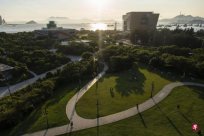In recent years, the Hong Kong Government has actively "told the story of Hong Kong" and refutes the negative reports of the media from time to time.This week, the Security Bureau and the police have issued a letter to the local and overseas media three times, accusing them of making mistakes.
But some comments believe that Western media have falsely reports to Hong Kong that the Hong Kong government responds in a timely manner, but there is still room for improvement in strategies.
The Editorial Department of the Wall Street Journal of the United States (September 2) published a comment article on the Hong Kong "Positioning News" case, describing that engaging in news work in Hong Kong may constitute a crime and call on Washington to sanction Hong Kong officials.Deng Bingqiang, director of the Hong Kong Security Bureau, went to the Wall Street Journal on Tuesday (September 3) to criticize the comment to distort the facts and expressed strong opposition.He emphasized that the Hong Kong government will not tolerate the spread of false information and incite hatred, nor will it be frightened by the so -called sanctions, and will unswervingly maintain national security.
The Hong Kong Ming Pao published on Wednesday (September 4), a media person Chen Jingxiang's comment on the "Position News" case, stating that inciting crimes caused a lot of pressure on the press in the press, questioning the ruling or making the media borne by the interviewees' remarks.Responsibility, worrying that this will lead to the gradual disappearance of the role of the journalism, disclosure, and checks and balances in the press.
Deng Bingqiang is also the editor -in -chief of the Xinming Pao, saying that the Hong Kong government does not agree with the content of the article, and must be strictly pointed out to be misleading to face up to hearing.
Deng Bingqiang emphasized that the problems and discussions raised by the comment article are based on the one -sided understanding of the reasons for the regional court's decision, and did not accurately reflect the legal principles established by the Hong Kong court in many cases.National security risk.
On the same day, the Hong Kong Police Office also believed in Radio Free Asia. According to a report on the cooperation of a complaint of complaint police classes and social welfare institutions, "Limin Association", it expressed strong dissatisfaction and severely condemned it.
Police criticized that the report made unreasonable doubts and misunderstandings about related cooperation, and used the Hong Kong National Security Law to "fasten their hats" to harm police -civilian relations and the image of the police force.
In recent years, the Hong Kong Government has actively "told the story of Hong Kong" and refutes the negative reports of local and international media from time to time.The 2024 Hong Kong Policy Law Report released by the US State Department pointed out that more than 150 foreign media received a complaint letter from the Hong Kong government last year.
Radio Free Asia reported on Wednesday that since May last year, Deng Bingqiang has issued 10 open letters to media agencies, including the Wall Street Journal has received the most letters, with five seals; followed by Bloomberg Society.seal up.Ming Pao is the first Hong Kong media on the list.
Kong Yongle, a lecturer at the School of Government and Policy Science, Chinese University of Hong Kong, said in an interview with Lianhe Morning Post that the Hong Kong Government had rarely actively countered the media before. As a result, during the anti -repair campaign in 2019, the government's opinions failed to reflect from the media on the spot.come out.The official has changed significantly in recent years, and has repeatedly failed to believe in Hong Kong and overseas media. In response to the false reports of the media in some issues, especially the national security field, it shows that the government attaches great importance to national security.Essence
Kong Yongle believes that the advantage of the Hong Kong government's strategy is to show that the Hong Kong government will clarify the wrong views proposed by the media or commentators in time, and avoid the people of the Hong Kong government avoiding problems or lack of positions.However, in recent years, China and the United States have fierce competition. Most of the content of Hong Kong in Western media has tended to be negative. The Hong Kong government has continued to high -profile media to further strengthen the negative perception of foreign readers in Hong Kong.
Kong Yongle suggested that the Hong Kong government can actively contact the neutral foreign media or reporters in the future, clearly explain the official policies, positions and views, and avoid negative phenomena of criticism every time foreign media reports.


